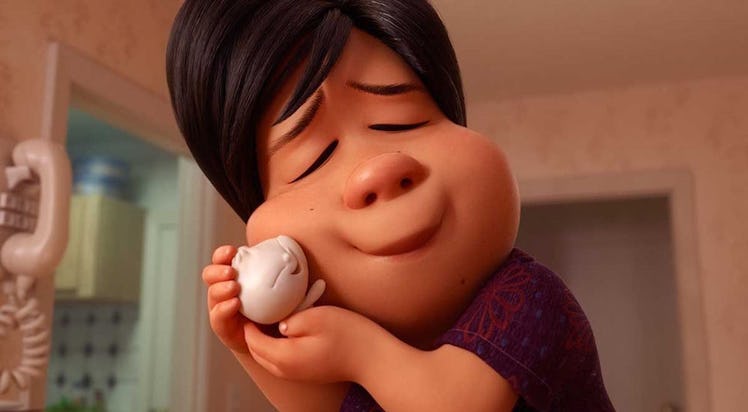
Pixar's Pre-'Incredibles 2' Short 'Bao' Has People Confused For All The Wrong Reasons
Before moviegoers could check back in with the superpowered Parr family in the much anticipated Incredibles 2, they were first treated to a short story about a woman and her anthropomorphic dumpling-son. It should have come as no surprise to any Pixar fan — just as Marvel has become known for post-credits scenes, Pixar famously includes animated shorts before each feature film — but strangely, there has been a notable amount of confusion about Bao online. Now, the short's director Domee Shi is explaining how Pixar's Bao is a story for immigrant parents and their children, and why it is so deeply affecting for certain groups of people but not for others.
In an interview with My Statesman, Bao director Domee Shi explained how she was inspired to create Bao from her own life experiences, as the daughter of an overprotective Chinese immigrant mother being raised in Toronto.
My inspiration mainly came from my own life. Growing up I was that overprotected little dumpling for my Chinese mom. I was an only child living in Toronto with my parents, and they’ve always kind of watched over me and made sure I was safe — kept me really, really close. And I just wanted to explore that relationship between an overprotective parent and their child with a dumpling as a metaphor, as weird as that sounds.
The short film explores the hyper-specific experience of what it is like to be a Chinese immigrant woman raising a child in a completely different culture. It depicts a woman who, while making traditional bao dumplings, witnesses one of the dumplings spring to life. She raises the dumpling like a son, doting on him and always keeping him close and out of harm's way. But eventually, the dumpling yearns for independence. He comes home with a fiancé and attempts to leave home, which causes the woman to break down and block the door. In the climactic scene, the woman eats her dumpling-son in order to prevent him from leaving her. Soon afterwards, we learn that the woman has an actual son who resembles the dumpling, and he returns home for a visit to make a meal with his mother.
For being only eight minutes long, Bao manages to weave a complex and specific portrait of empty nest syndrome exacerbated by cultural division, but not everyone in the Incredibles 2 crowd was able to fully appreciate the short film. Searching Bao on social media, you will find a number of people who were confused by the dumpling fable:
Perhaps some moviegoers were confused by Bao because it depicts a very specific experience that not everyone can relate to, but also, it is not terribly difficult to understand what is going on in the short even if you are not the child of an immigrant.
Polygon writer Petrana Radulovic, herself the child of Asian immigrants, wrote an essay about how Bao deeply affected her. She points out how the short film hinges on a cultural clash between how family is expected to behave in Asian cultures versus Western society. In Asian communities, Radulovic states, children usually live with their parents until marriage, an ideal that is directly contrasted by the Western expectation of children to leave their parents' home at around age 18 and never return. This is where the central tension in Bao comes from: the mother is accustomed to a culture where her son lives with her into adulthood, but her son was raised in a culture that told him to set out on his own much sooner.
If you did happen to be one of the people confused by Bao, hopefully this helped clear it up for you.